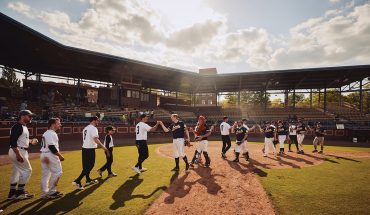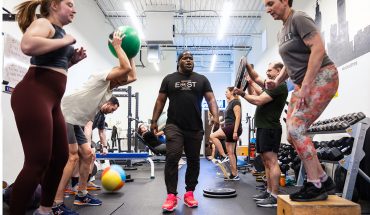Former athlete Chris Combs takes on ALS with his team of family & friends
by Hampton Williams Hofer | photography by Jill Knight
Two years ago, Raleigh native Chris Combs, a 42-year-old husband, father of three, and former baseball player for N.C. State and the Pittsburgh Pirates, found himself struggling to fasten the top button of his dress shirt. The 6-foot-7-inch standout athlete, whose legendary lefty swing has him tied for fifth all-time in career home runs in the N.C. State Record Book, has never been lacking in strength or coordination. When he couldn’t put on a tie, he knew something was wrong. “I had elbow problems in baseball, so I thought maybe it was to do with that,” Combs says. He recalls lying in bed with his muscles twitching so badly he couldn’t sleep.
A winding path of tests, cross-country visits to specialists, and misdiagnoses finally ended in an exam room at Johns Hopkins May 2, 2016, when the doctor told Combs he has amyotrophic lateral sclerosis. Better known as ALS, or Lou Gehrig’s disease, the brain disease targets motor neurons, and it’s usually fatal within 2-5 years. But don’t tell that to Combs and his wife Gena Combs, because they aren’t having it. They remain indomitable in the face of a terminal diagnosis, rallying with eagerness and relentless hope to fight back and find a cure. In less than two years, this Raleigh couple has transformed the field of ALS research by raising millions of dollars to fund groundbreaking studies.
Immediate action
Combs’s #26 baseball jersey hangs on the wall of his office at the N.C. State Wolfpack Club, where he is associate director. In 1997, his senior year at N.C. State, Combs was drafted by the Pittsburgh Pirates in the fifth round of the amateur baseball draft. Injuries cut his professional career short, so he returned to his alma mater in 2005. Since his diagnosis, he still comes into work most days, drives, and walks; he is grateful that his ALS, which will eventually rob him of those abilities, has been slow to progress.
The Wolfpack Club raises money for athletic scholarships and facilities, meaning Combs is a fundraiser by trade. Now, as seems to be a pattern in his life, he’s taken it to the next level by becoming a top fundraiser for ALS. Within days of his diagnosis, Chris and Gena Combs founded the organization Team Chris Combs to raise money for Project ALS, a nonprofit that funds the most promising scientific research in the hunt for a cure.
When they first shared the news of Combs’s ALS, the Combses were floored by the response from the Raleigh community. “Everyone wanted to do something to help,” Combs says, “so we had a meeting at our house. A buddy threw out the idea: why don’t we do an event at The Umstead?” And so began the planning for the Hope Gala, an intimate formal event featuring a live and silent auction that grossed a staggering $1 million in only a few hours. And that was just the first one in 2016, held just four months after Combs’s diagnosis. The second annual Hope Gala last September brought in another $1.1 million, thanks in part to live auction items such as a $112,000 shotgun donated by Italian arms manufacturer Beretta, as well as trips to New York and Italy. The team who runs the event, a group of the Combses’ close friends, is hopeful for continued success at the third annual Hope Gala this coming September. Battling ALS notoriously makes a person tired, but Combs says that on big nights like those, the adrenaline beats the fatigue: “The support gives you hope. It keeps you fighting.”
Donations to Team Chris Combs go directly to Project ALS to fund research, and the money doesn’t just come from black-tie events. Raleigh and especially Combs’s N.C. State community have rallied behind the cause, and the Team’s work is massive. Team Chris Combs logos have been popping up at Glenwood Village Tire Pros, Bad Daddy’s Burger Bar, and Peter Millar, among many others. There are walks and baseball tournaments and hat sales; there are big-ticket anonymous donors; there are public displays of support from the N.C. State men’s basketball staff, who grew beards for the month of November to raise awareness in support of Chris. “Chris and Gena’s positivity and their perseverance in this fight is inspiring,” says Mike Becker. Becker is a family friend (and Hope Gala team member), and his own father defeated the odds with a 12-year battle against ALS. “Chris is an exceptional man,” Becker says. “I always walk away a better person after spending time with him.”
For all of Combs’s stardom, and despite his towering presence, he has a humble demeanor. He is soft-spoken and shirks attention. “When I once spoke with Chris about his condition, he quickly turned the conversation away from himself,” says Glenn Veasey, who has been friends with Combs for two decades (and is another Hope Gala team member). “Anyone who gets the opportunity to spend some time with Chris selfishly wants more. He’s special in that way.”
Combs’s ardent fundraising is paying off: In a lab at Columbia University, doctors and researchers are testing FDA-approved drugs for their potential to treat ALS. Instead of waiting 5 to 15 years for the FDA to approve a new drug, it makes more sense – especially for someone like Combs – to try to repurpose ones that are already approved for use immediately. It’s groundbreaking work, and the direct result of the Combses’ foundation. “Team Chris Combs has enabled the establishment of (this) Project ALS Pre-Clinical Core at Columbia University, the first such effort. The Pre-Clinical Core tests the heck out of several potential ALS drugs,” says Valerie Estess, co-founder and director of research at Project ALS. “The contributions of the entire Combs family to Project ALS research have been transformative for the field.”
ALS is difficult to diagnose, and even harder to treat. The disease weakens a person’s motor neurons, which send messages from the brain to muscles throughout the body. As the motor neurons weaken, so too does a patient’s ability to walk, speak, swallow, and then breathe. Project ALS’s current research focus is on slowing the progression of the disease until it can be cured. Funding from Team Chris Combs is also pushing forward critical genetics studies with implications for all forms of ALS. “With Team Chris Combs, Project ALS scientists have zeroed in on several new genes of interest,” says Estess. “Recent studies provide further evidence that ALS, Alzheimer’s, and Parkinson’s may have a lot in common.”
This is the battle of Combs’s life, and it’s a good thing he’s tough. Sports have taught him to never let up: in college, he was known to hit home runs and pitch in the mid-90s under pressure for comeback wins against more than one ACC rival. He’s from a family with generations of friends and connections in Raleigh and at N.C. State. “My dad played baseball here at State. My uncle played football and baseball here. My dad coached summer ball, and I was a ball-boy for the basketball games,” Combs says. He’s built a big network and learned plenty of important lessons about courage and hard competition.
In search of miracles
The community behind Combs is solid, but here’s the other thing about him, the real game-changer: There’s a fiery, well-dressed woman by his side who refuses to back down from this fight. Gena Combs, co-owner and buyer for Raleigh boutique Gena Chandler, may be small, but she is a force to be reckoned with. She has marched head-on into the storm of ALS, reading, talking to doctors, learning as much as possible about things like spinal inhibitory interneurons. “She has a true talent for mobilizing people. She makes you feel part of something – one big loving family that is going to crack the ALS code,” says Estess. Soon after Combs’s diagnosis, the couple flew to New York City to meet with Valerie and Meredith Estess, the co-founders of Project ALS, whose motivation, stemming from their deeply personal connection to the disease, matched the couple’s. The Estess sisters started Project ALS 20 years ago along with their sister, Jenifer, who was diagnosed with ALS back when there was no structured effort underway to solve it. They developed a new paradigm for ALS research, giving hope to patients like Combs. Gena Combs has joined the Project ALS board, making frequent trips to New York City to discuss innovative research and strategies. “Gena Combs,” Valerie Estess says, “is one of the most effective leaders that Project ALS has seen in its twenty years.”
The Combses, like any couple, have had their ups and downs. It’s not always strength and optimism when facing the realization that, for instance, Chris Combs may not see his children grow up. “We have times when we get down, when we’re struggling, but we’re always there for each other,” Chris Combs says. “I think it has strengthened mine and Gena’s relationship. Nobody knows what tomorrow brings, but for me in dealing with my diagnosis, it has made me cherish special times.” Their children, Anne Marie, 11, Ava , 7, and Christopher, 5, know their dad has ALS. “They don’t know exactly what that means,” says Gena Combs, “but even we don’t know what it means. There are so many types of ALS, so many possible futures with new medications. Miracles happen every day.”
One such miracle may be underway a little closer to home, at Duke University’s ALS Clinic, founded and directed by Combs’s doctor, Duke neurologist Dr. Richard Bedlack. “We have an incredible research pipeline set up to test in 2018, including drugs that manipulate genes, drugs that optimize brain energy production and muscle strength, and even stem cells,” says Bedlack, a renowned ALS expert, who has found 36 people with ALS who appear to have recovered significant lost function. He wants to make such reversals more common. Combs is hugely fortunate to live so close to Bedlack, who claims that Combs is the one who inspires him: “Chris and his family have stepped up to fight this disease on a global scale, raising a ton of awareness and over 2 million dollars for ALS research,” Bedlack says. “In between these efforts, they are living an amazing life together, traveling the world, and having a lot of fun.”
Even with an uncertain future, Combs says his diagnosis has improved his quality of life. “It’s been amazing to see the good in people.” For the Combses, each fundraiser, no matter how small, means another piece in solving the puzzle that is ALS. “There are so many clinical trials,” says Gena Combs, “so many shots on goal, more than ever.” And soon, they have to believe, one of those shots will go in. Meanwhile, Chris has a life to live, peewee flag football games to attend, and bedtime stories to read. “Chris Combs may have ALS,” Bedlack says, “but ALS does not have him.”






